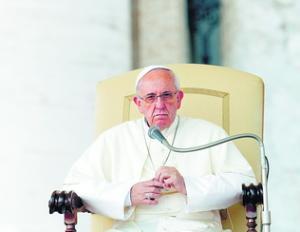Doblin: Pope Francis Rips off the Roof
By Alfred P. Doblin
SOMETHING remarkable is happening in Rome. Fifty years ago, Pope John XXIII opened a window in the Catholic Church. Pope Francis has torn off the roof. In a remarkable interview with a Jesuit journalist, the Rev. Antonio Spadaro, conducted this summer and published this week, the pope does more than tug at the cobwebs or move the furniture; he lays the room bare. “The church sometimes has locked itself up in small things, in small-minded rules,” he said. It is a stunning, simplistic assessment of what has hurt the Catholic Church. Francis clearly sees that the institution and the strident tone it has taken on all things small has not been in concert with a mission of mercy for all. Francis’ comments on gays will be the ones most discussed on cable and the Internet. The media sometimes has locked itself up in small things, as well. The pope has not changed church teachings on homosexuality. He does not question them, dispute them or purport to rewrite them. On homosexuality, the pope is moving away from a conversation based solely on sex. He said: “When God looks at a gay person, does he endorse the existence of this person with love, or reject and condemn this person? We must always consider the person.” No one can and should be judged by only one part of who he is. Yet too often the Church has focused on one aspect of what someone does and not on the total picture. Francis is saying God sees people in 3D IMAX; there is nothing small screen about who we are. This should not sound radical, but it is. Look no further than the bishop’s chair in Newark. Archbishop John Myers is a throwback to imperial Rome. It is his way or the Parkway and that style hurts Catholics sitting in the pew. “The people of God want pastors, not clergy acting like bureaucrats or government officials,” the pope said. Tack that message on the doors of the cathedral in Newark like Martin Luther’s 95 theses. The great Cardinal Joseph Bernardin of Chicago was loved or despised by many Catholics because of his teaching of a seamless garment of life. Bernardin was not soft on abortion, but he believed Catholics were not understanding that being pro-life meant more than being anti-abortion. It meant defending and supporting the poor and disenfranchised, siding against the death penalty, helping immigrants and refugees and aiding the elderly. To some conservative Catholics, Bernardin was speaking heresy because he was not solely focused on the abortion issue. Francis is the same kind of heretic. It is not that the pope should not stop talking about Catholic teachings, but it is time for a pope and the Church to talk about all the teachings. It’s more than abortion, contraception and homosexuality. Again, I think of the Catholic bishops in the United States who threaten to deny Catholic politicians communion if they support civil laws upholding a woman’s right to choose. This is moral blackmail against individuals who have taken a single policy position contrary to that held by the Catholic Church. Yet, I cannot recall a single bishop threatening to deny communion to a public official who supported the death penalty. The wrath of God, as meted out by some bishops, is selective. While his metaphor may sound stilted in English, read this from the pope’s interview: “We must not reduce the bosom of the universal church to a nest protecting our mediocrity.” Archbishop Myers, are you listening? Pope Francis is standing up. He’s shouting. He is as unlikely a warrior for the defenseless as was Oscar Romero, the conservative prelate who found voice and strength as the archbishop of El Salvador, speaking out against an oppressive government until he was murdered while celebrating Mass. The pope’s interview published in English in the Jesuit magazine America is worth reading. Every word of it. Because the pope approved what was written about him, these words are all the more significant. They are not casual remarks. Catholics looking for the Church to ordain women as priests or celebrate same-sex marriages will be disappointed. But Catholics looking for a Church that refuses to condemn people based on perception or a single aspect of who they are will find more than comfort. They will find hope. As an opera buff, I was surprised to read the pope use “Turandot,” Puccini’s last opera, as a reference. The pope’s interviewer was equally surprised as he recites back the specific lines in the opera that the pope refers to – a riddle posed to a seeker of Turandot’s hand in marriage. The riddle’s answer is “hope.” The pope believes people should not be optimistic about the crises in the world, they should have hope. It’s a pragmatic distinction by a pragmatic and prayerful man. The world needs hope. Francis should come to the United Nations. He has something to say at a time when leaders speak only the language of noise, when a Russian autocrat can masquerade as a man of peace, when a great democracy is more consumed with partisan backstabbing than governing, when a two-bit church in Kansas can disrespect dead soldiers at funerals, when we the people have been replace by “i” the phone, pod and pad. Come to the United Nations, Pope Francis. This is your time. Contact: doblin@northjersey.com
|
.
Any original material on these pages is copyright © BishopAccountability.org 2004. Reproduce freely with attribution.
